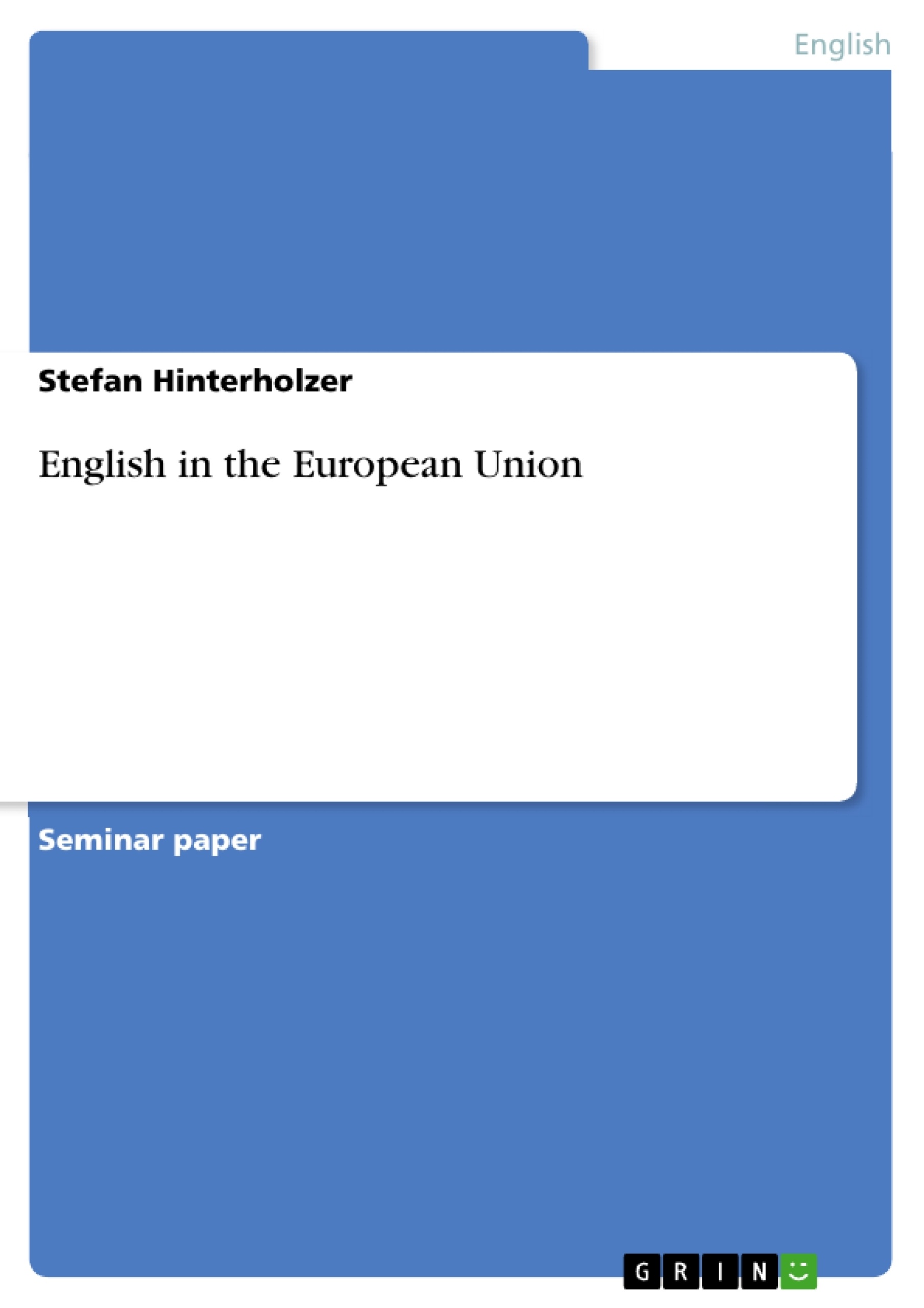The European Union is not only an economic community. It is also a unique language community in which each language has its place and its right to exist. Today, English is the dominant language in the world serving as a first or second language, a working language, a lingua franca etc. for many people. Nevertheless, the position of the English language is not the same in the European Union as in a global context. This paper will focus on the position of English in the European Union being only one of 23 official languages. It will be analyzed in how far the dominance of English affects the other languages and the institutions of the European Union and to which extent English has the status of a European lingua franca. On the other hand, the influence of the other languages on English will be looked at, which will lead us to the phenomenon of ‘Euro-English’. Finally, the opposition of other language communities against the dominance of English will be discussed.
Inhaltsverzeichnis (Table of Contents)
- Introduction
- 1. The EU Language Policy
- 1.1. Official Languages
- 1.2. Lost in Translation?
- 1.3. Languages in the EU Institutions
- 2. English as a European Lingua Franca
- 2.1. Motivation
- 2.2. Current Situation
- 2.3. Functions
- 2.3.1. The Imaginative/Innovative Function
- 2.3.2. The Interpersonal Function
- 2.3.3. The Instrumental Function
- 3. Euro-English
- 3.1. Vocabulary - Discoursal Nativization
- 3.2. Vocabulary - Abbreviations
- 3.3. Vocabulary - Europeanization
- 3.4. Pronunciation
- 3.5. Grammatical Structures
- 4. The dominance of English
- 4.1. Background
- 4.2. English Outrunning French
- 5. Opposition
- 5.1. Use of Native Languages
- 5.2. Protection of Culture
- 5.3. The French Opposition
- Conclusion
Zielsetzung und Themenschwerpunkte (Objectives and Key Themes)
This paper examines the position of English in the European Union, focusing on the extent to which its dominance affects other languages and institutions. It analyzes the role of English as a European lingua franca, considering both its influence on the EU and the influence of other EU languages on English, leading to the phenomenon of "Euro-English." The paper also explores the opposition to English dominance from other language communities.
- The EU Language Policy and the role of English
- English as a European lingua franca
- The impact of English on the EU institutions and other languages
- The emergence of Euro-English
- Opposition to English dominance
Zusammenfassung der Kapitel (Chapter Summaries)
The introduction lays out the context of English as a global dominant language and its specific position within the European Union. It introduces the paper's focus on the influence of English on EU institutions and languages, as well as the emergence of Euro-English.
Chapter 1 explores the EU Language Policy, detailing the official languages of the EU and the distinction between authentic and working languages. It discusses the role of translators and the increasing number of documents needing translation. Chapter 1 also highlights the complexities of the translation process and the challenges posed by a large number of official languages.
Chapter 2 examines English as a European lingua franca, exploring its motivations, current situation, and various functions within the EU. It discusses the influence of English on the imaginative, interpersonal, and instrumental functions within the European context.
Chapter 3 focuses on the phenomenon of Euro-English, analyzing vocabulary adaptations (discoursal nativization, abbreviations, Europeanization), pronunciation variations, and grammatical structures specific to the European context.
Chapter 4 investigates the dominance of English, highlighting its historical background and its increasing prevalence compared to French. It discusses the impact of English dominance on the EU institutions and languages.
Chapter 5 explores the opposition to the dominance of English, focusing on the arguments for using native languages, protecting cultural identity, and the specific case of French opposition.
Schlüsselwörter (Keywords)
This paper focuses on the position of English in the European Union, exploring its role as a lingua franca, its impact on EU institutions and other languages, and the emergence of Euro-English. Key concepts include official languages, translation, authentic languages, working languages, lingua franca, dominance, influence, opposition, cultural identity, and language policy.
- Quote paper
- Stefan Hinterholzer (Author), 2007, English in the European Union, Munich, GRIN Verlag, https://www.grin.com/document/70524




